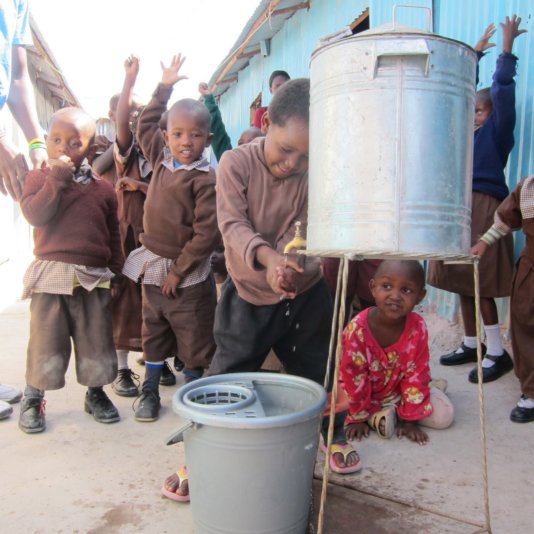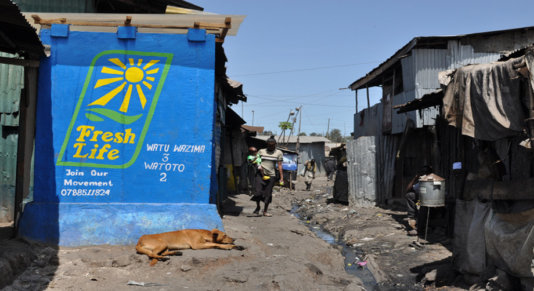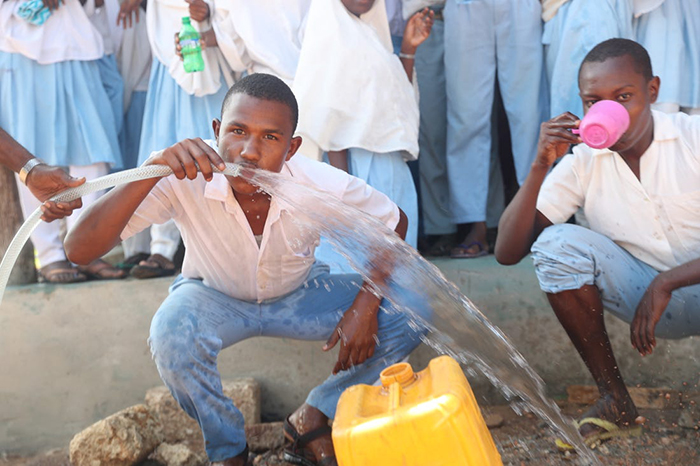- About
- Topics
- Picks
- Audio
- Story
- In-Depth
- Opinion
- News
- Donate
- Signup for our newsletterOur Editors' Best Picks.Send
Read, Debate: Engage.
| November 23, 2016 | |
|---|---|
| topic: | Health and Sanitation |
| tags: | #Kenya, #organic fertilizer, #Sanergy, #sanitation |
| located: | Kenya |
| by: | Bob Koigi |
The problem is especially entrenched in developing countries. In Kenya for example, only about 30 per cent of the population can access safe sanitation with over 6 million people defecating in the open.
One company is changing this narrative. Sanergy works in Kenyan slums by installing pay per go toilets which are operated by the slum dwellers, creating jobs while improving sanitation. The company then collects the human waste and turns it into organic fertilizer which it then sells to farms.
FairPlanet spoke to one of the company’s founders David Auerbach about the business model, the impact it has had on the slum life and sanitation and how to address the global sanitation crisis.
FairPlanet: Tell us a bit about Sanergy?
David Auerbach: Sanergy is a social enterprise that was founded in 2010 by three MIT students: David Auerbach, Ani Vallabhaneni, and Lindsay Stradley. We build healthy, prosperous communities through the provision of hygienic, affordable, and accessible sanitation. We work in urban informal settlements and use a full value chain approach to provide our sanitation services.
There are five critical steps in our value chain that ensure we tackle the sanitation challenge sustainably. They are building, franchising, supporting, collecting and treating, converting and distributing. We build high-quality, low-cost hygienic facilities called Fresh Life Toilets which are then franchised out to community members known as Fresh Life Operators who run them as businesses.
Currently, our Fresh Life Toilets are franchised through three main models:
We offer operational support to our Fresh Life Operators to ensure that their Fresh Life Toilets are running smoothly and successfully. This support includes marketing and branding as well as trainings on business practices, hygiene education, and good customer support.
On a regular basis, we then safely and professionally collect waste from all Fresh Life Toilets in our network, remove it from the communities we serve, and take it to a central processing facility where it treated and converted into high-value end-products, including nutrient-rich, pathogen-free Evergrow Organic Fertilizer distributed to small- and medium-sized farms and safe protein input for animal feed, sold to Kenyan feed millers.
Why focus on sanitation?
Around the world, 2.5 billion people lack access to hygienic sanitation solutions. But that’s only part of the problem; 4.1 billion people live in communities where human waste is not properly contained and can contaminate the surrounding environment. Poor sanitation costs the global economy USD 260 billion per year.
In Kenya’s urban slums, 8 million people have limited or no access to hygienic toilets. This results in 17,100 Kenyan children under the age of five dying each year from diarrheal disease, 90 per cent of which is due to poor sanitation. The Kenyan economy loses $270 million each year from sanitation-related illness and death.
And the problem is not just about access to toilets; it is also about the containment, collection, removal, and treatment of the waste generated. In the informal settlements where we work, residents generate 4 million tons of fecal sludge per year, most of which is dumped untreated into waterways. In fact, 90 per cent of sewage in Nairobi is released without ever being treated.
That is why effectively tackling the sanitation crisis in these areas requires more than the usual approach of just building toilets.
How many people have you been able to reach with the project?
So far, we have a network of 800 active Fresh Life Toilets run by 400 Fresh Life Operators. Our Fresh Life Toilets have a cumulative usage of 37, 668 every single day.
How easy/hard has it been?
Building and scaling the Sanergy model has had its challenges. Encouraging potential users to try the Fresh Life Toilet has been an ongoing obstacle that we’ve worked to address. We held regular marketing events in the communities we serve to encourage that first use. Fortunately, we’ve found that approximately 80% of first-time customers become regular users, so the challenge simply lies in encouraging that first use.
In addition, developing end-products that meet the needs of Kenyan farmers – and that they are willing to buy – has posed significant hurdles for us. But we have a relentless and creative team who are always willing to figure out how best to optimize processes and products.
How is waste treated after collection?
Once the waste is collected, we take it to our processing facility where is it treated and converted into high-value end-products, primarily Evergrow Organic Fertilizer, a high-quality, commercial grade organic fertilizer that improves crop yields and enhances soil fertility, and PureProtein, an insect-based protein input for animal feed.
What do you consider the greatest achievement in your journey?
We recently opened our 800th active Fresh Life Toilet; we are honored to be working with wonderful community members to develop a sustainable sanitation solution for Nairobi’s residents.
What are the greatest obstacles of the project?
Working in the slums, access to land on which our Fresh Life Operators can build and run their Fresh Life Toilets has been challenging. However, working with the local government officials has helped our operators maneuver through this process smoothly and successfully.
It has also been challenging to enter the organic fertilizer market. Even though there is a desperate need for high-quality organic fertilizer, farmers are reluctant to adopt new products. Now that we have several seasons’ worth of results to share, farmers are more willing to try our products for themselves.
What is the one thing that this sanitation project has taught you?
In talking with community members, I am always struck by how eager they are to improve their communities. Yes, there is a business motivation for people to run a Fresh Life Toilet, but the
How do you work with local communities to ensure ownership and sustainability of the project?
We couldn’t do what we do without buy-in from community members. First, we make sure to hire as much as possible from the communities we serve; about 60% of our staff come from these neighborhoods.
Second, we conduct focus groups and field visits with potential users as a part of the design process for any new product or service. This way, we can ensure that we are developing solutions that people want and are willing to pay for.
Finally, with our franchisees, we sign a contract of agreement where they have an obligation to abide by the standards of our Fresh Life network, while we must provide services such as regular waste collection at their Fresh Life Toilets.
Has this project created a behavioural/ attitude change around slums in terms of sanitation and how?
The presence of Fresh Life Toilets in the slums has had a noticeable impact among community members. In areas with Fresh Life Toilets open defecation has greatly reduced.
In addition, our Fresh Life Operators and regular Fresh Life users have become champions for good hygiene practices such as proper hand washing.
Another interesting aspect of the project is entrepreneurship and job creation. Tell us about that?
So far, Sanergy has created over 800 jobs. We have a staff population of 250, 90% of whom are Kenyan, and 60% of whom come from the local community where we operate. The remainder are Fresh Life Operators and the staff they hire to maintain the toilets on their behalf.
What’s next for the project?
There are over a thousand cities with infrastructure and demography similar Nairobi, where Sanergy’s model could work as an alternative sanitation solution for burgeoning populations. Sanergy’s vision is to create a sustainable sanitation model that can successfully be scaled and replicated across these cities.
By copying the embed code below, you agree to adhere to our republishing guidelines.


